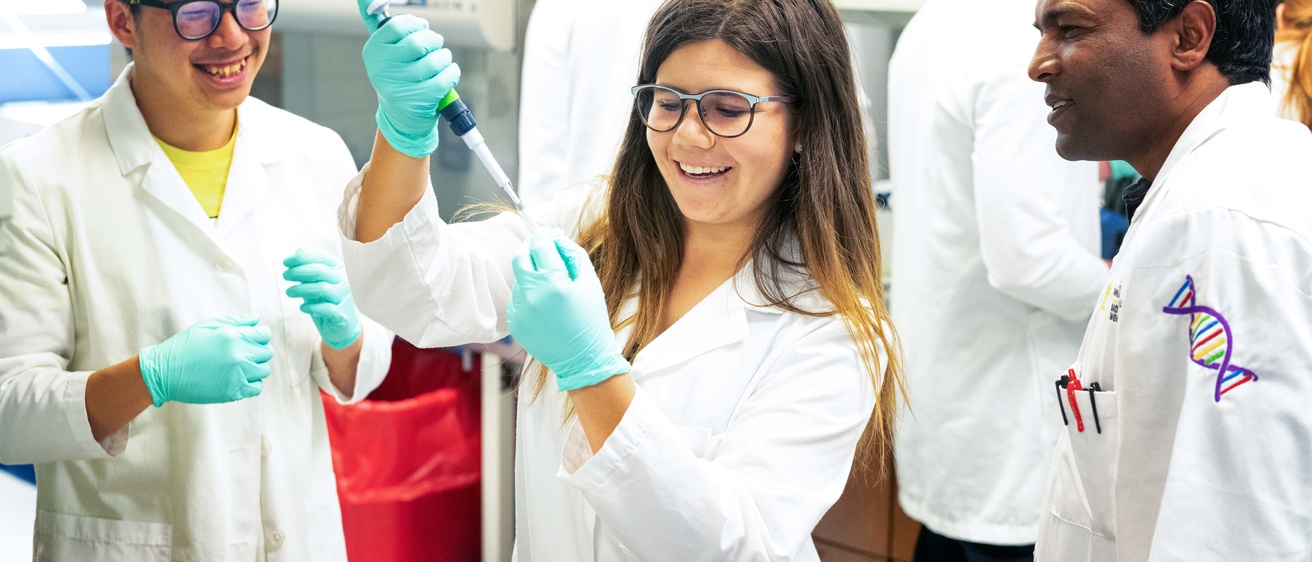CBCB industry partnerships and internship opportunities for students.
The CBCB organizes a seminar for student to share and present their research. This seminar provides an opportunity for the student to expand their knowledge and help round out their studies as well as discuss ideas and collaborate with other students and faculty.
The CBCB co-sponsors and organizes seminars covering the spectrum of the field including: Bioinformatics, Mathematical Biology, Computational Biochemistry, Computational Biology, Neurosciences, Genetics and Biomedical Engineering. These seminars provide an opportunity for the Center's membership to expand their knowledge and help round out their expertise in this highly diverse field of research.
Computational Resources and Space
The CLCG and CBCB consist of approximately 20 full-time faculty, post-docs, staff, and students occupying 4,200 sq.ft. housed in the Seamans Center for the Engineering Arts and Sciences Building on the University of Iowa main campus. This facility is wired for high-speed networking (gigabit ethernet – hardwired and wireless, and includes 1 dedicated experimental Linux cluster, more than 25 computing systems (workstations and servers), more than 40 Terabytes of RAM, and more than 1 Petabyte of file storage space. Two distinct networks are maintained to keep experimental and development systems separated from production systems which have restricted firewall access, and are HIPAA compliant for all PHI-related data.
Office, and laboratory space is available for all Principal Investigators, co-investigators, post-docs, staff and students. Convenient meeting space is also available. Offices are equipped with computers and printers, video-conferencing, and telephone conferencing. PI offices are equipped with video projection capabilities for small to medium sized collaborative meetings, and for multi-site video conferencing. All key personnel have Linux and/or Mac/PC computers (desktop and portable) connected to the network.
Funding Opportunities
A number of pilot research support mechanisms are available. In addition to CBCB Seed grants, an interdisciplinary graduate program provides support for PhD students, and through collaborations with other UI Centers, Institutes, Industrial Partners and Labs, it is often possible to pursue novel ideas.
Want More Information?
About BCB
The field of Bioinformatics and Computational Biology (BCB) is characterized by a highly diverse confluence of traditional academic disciplines. Informatics and Bio-science are the umbrella terms given to a set of allied disciplines which make up the field, but a much larger array of traditional areas contribute to the set of tools needed by individuals training for this new and expanding interdisciplinary field. Biomedical Engineering, Electrical and Computer Engineering, Computer Science, Applied Mathematics, Genetics, Biology, Anatomy and Cell Biology, Micro Biology, and Biostatistics are the principal allied disciplines.
BCB as an emerging discipline involves the creation of new methods for applying the capabilities of advanced mathematics, engineering and computation to problems of basic life science and biomedical interest. Examples of these problems include the understanding of the human genome, the genetic basis of disease, evolution of plants and animals, and the relationships between micro-organisms and higher-order forms of life. This list is by no means all-inclusive.
Additional Useful Coursework
New courses are continually being developed to add to the list of courses above including courses in databases, algorithms, and proteomics. Depending on a student's area of interest for thesis research, the following courses are suggested as possibilities for further study and investigation:
Biology/Chemistry
Courses
- Fundamentals in Genetics 2:128
- Principles in Molecular and Cell Biology 156:201
- Biochemistry 99:110
- Evolution 2:131
- Genetic Analysis of Biological Systems 127:150
Computer Science
Courses
- A Practical Introduction to Computer Science 22C:104
- Computers in Engineering 59:017
- Introduction to Software Design 55:033
- Programming in C++ 22C:112
- Introduction to Database Systems 22C:144
- Algorithms 22C:044
- Design and Analysis of Algorithms 22C:153
Mathematics
Courses
- Biostatistics 22S:101
